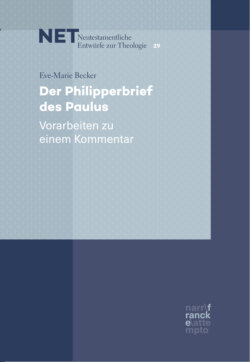Читать книгу Der Philipperbrief des Paulus - Eve-Marie Becker - Страница 27
На сайте Литреса книга снята с продажи.
Оглавление2. 1 Cor 12071 Kor12 and 2 Cor 11082 Kor11: anxiety in community politics and ethics
Earlier in Paul’s letter-writing, “anxiety” and “care” appear as anthropological tools to guide ethics and community life. And already in these letters, Paul elaborates on his personal experiences and perception of “anxiety.”
2.1. Paul’s anxiety as apostle: 2 Cor 11082 Kor11:28082 Kor11,28
In 2 Cor 11082 Kor11, Paul confesses that his apostolic duties continuously worry him: “And, apart from other things” – he says –, “there is the daily pressure upon me of my anxiety (μέριμναμέριμνα, μεριμνάω) for all the churches” (v. 28). Apostolic ministry is busy and exhausting, and it involves dealing with conflicts and missionary competition. In 2 Cor 10-13082 Kor10-13, the conflict with the Corinthian community is escalating. In Paul’s opinion, the apostolic ministry is full of personal “anxiety.” Nevertheless, commentators on 2 Cor – such as Margaret E. ThrallThrall, Margaret E. – tend to interpret the Pauline reference to “anxiety” as either insignificant or a negative expression.Thrall, Margaret E.1 We might follow Thrall in valuing “anxiety” as something negative here – Paul is seemingly troubled about the Corinthians. However, the letter of Aristeas offers a different interpretation (271). In this letter, it is stated: “… to the question …, ‘what preserves a kingdom?’ the answer is given, μέριμναμέριμνα, μεριμνάω καὶ φρόντις …, ‘care and watchfulness to see that no injury is inflicted by those who are set in positions of authority over the people’.”2 A more positive connotation of Paul’s view on μέριμναμέριμνα, μεριμνάω is plausible; namely, that Paul views μέριμνα as a part of his job description in a leading position. Interpreters like Thrall thus miss some crucial points. By expressing his personal “anxiety”, Paul interprets his apostleship in individual terms. He does so quite comprehensively – and here, Thrall is right in her overall analysis of 2 Cor 11. “Furthermore,” she concludes, “the following verse suggests anxiety. From Paul’s point of view, he has had, and at this point has still, ample cause for anxiety about the Corinthian congregation.”Thrall, Margaret E.3
Unlike E. R. DoddsDodds, E. R. (s. above) or Gerd TheißenTheißen, Gerd,Theißen, Gerd4 I am less interested in “anxiety” as a religious tremendum or a psychological phenomenon. Instead, I suggest that, in order to describe his current situation as an apostle, Paul makes use of an anthropological pattern which he further develops toward selfhoodSelbst, self, selfhood and individuality. And this is true even though Paul might use his expression of “anxiety” as a rhetorical strategy: He certainly intends to legitimize his personal engagement in Corinthian affairs (cf. 2 Cor 10-13082 Kor10-13). Paul explores “anxiety” as a pattern of selfhood primarily as a personal rhetorical strategy to authorize his public ministry.
2.2. AnxietySorge in community life: 1 Cor 12071 Kor12:24f.071 Kor12,24f.
Although Paul applies the phenomenon of human “anxiety” and “care” to community life, he is particularly interested in the role of the individual community member. In 1 Cor 12071 Kor12, Paul describes the body of the ecclesia as being guided by “anxiety” and “care”. He states, “But God has so composed the body …, that there may be no discord of the body, but that the members may have the same care for one another (ὑπὲρ ἀλλήλων μεριμνῶσιν)” (v. 24f.). Paul writes about the concrete need to “take care” of one another because the Corinthians are “individual members” of the body of Christ (v. 27). In light of the desire for higher, spiritual and eschatological gifts (χαρίσματα, v. 31), being engaged in communal “care” appears as an individual activity of “anxiety.”Jerusalem082 Kor08-0909Gal02,10φρονεῖν, φρόνησιςReumann, JohnHeidegger, MartinSorge1
In this approach to “anxiety” and “care,” Paul even sees himself as a paradigm: “What you have learned and received and heard and seen in me, do …” (Phil 4:9). Paul is an example of personal anxiety. But how does Paul deal with “anxiety” and “care” when it concerns the issues of daily life – especially those issues that do not concern him? Can Paul also act as a personal example in the field of anxiety and family life when he himself refrains from living in wedlock (1 Cor 9071 Kor09)? Does he adhere to ancient ascetic verdicts – expressed by Menander and others – according to which “having a wife and being the father of children … brings many anxious moments in life?”μέριμνα, μεριμνάω2 To answer this question, I will examine 1 Cor 7071 Kor07, where Paul conceptualizes another type of individual “anxiety” and “care”. It is in the discourse about sexual ethics that μεριμνάωSorge occupies its most prominent place – even as wordplay (v. 34a: μερίζομαι).3
